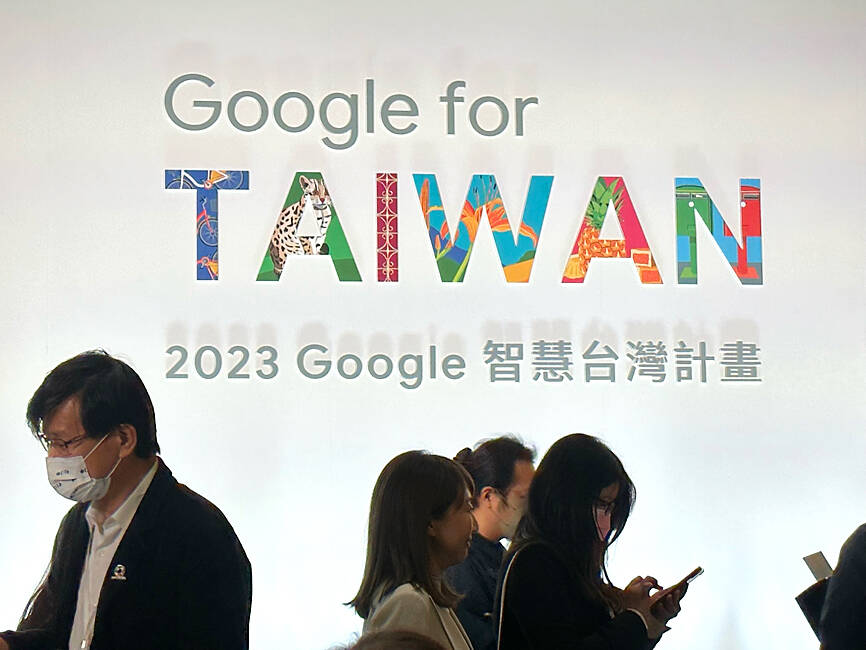Google yesterday launched a NT$300 million (US$9.74 million) fund to facilitate the digital transformation of the news industry in Taiwan, with the US tech company expected to hold a second round of talks with local media outlets to address the issue of sharing revenue with publishers.
The launch of the Taiwan News Digital Co-prosperity Fund came after the first round of talks between Google, Taiwanese media outlets and a cross-ministerial task force led by the Ministry of Digital Affairs wrapped up, Deputy Minister of Digital Affairs Lee Huai-jen (李懷仁) told a news conference in Taipei.
“We are glad that the first round of talks has yielded this result,” Lee said. “This is the first step. We believe more progress will be made going forward... We want to see more collaborations between Google and news outlets through more talks.”

Photo: CNA
The ministry welcomes the initiative from Google and supports local publishers’ call for technology companies to pay publishers for linking to their content, Lee said.
The ministry stands by its statement that resorting to legislation to regulate the payment of news content is “always an option,” he added.
A new round of negotiations is set to take place later this month, Lee said.
Facebook owner Meta Platforms Inc has also approached the ministry to introduce a similar program, Lee said in response to a reporter’s question.
The Taiwan News Digital Co-prosperity Fund, tailor-made for the local news industry, is “an innovative initiative and a new model to support the digital future and prosperity of the local news ecosystem,” Michaela Browning, Google vice president of government affairs and public policy in Asia Pacific, told the news conference.
“It will provide N$300 million in three years to support publishers to strengthen their digital capabilities, expand their reach and improve organization’s engagement,” Browning said.
The Digital Transformation Association, which helps manage the fund, said it would start accepting applications in May.
As Google has introduced a similar initiative in the EU, it might provide a model for the association to run the fund in Taiwan, the group said.
Google said Taiwan plays a substantial role in assisting the company in developing new hardware, making Taiwan the biggest hardware development center only after its US headquarters.
Google plans to launch a second hardware development center soon, Tina Lin (林雅芳), managing director of sales and operations at Google Taiwan, told the news conference.
The construction of the center in New Taipei City’s Banciao District (板橋) was delayed by the COVID-19 pandemic, she said.
Google also plans to introduce the company’s first semiconductor research program to Taiwan later this year, Lin said. Students from four local universities will be involved in this program, she said.
Minister of Digital Affair Audrey Tang (唐鳳) told reporters on the sidelines of a meeting at the legislature’s Transportation Committee that the fund is “a welcome development,” and confirmed that Meta is formulating a similar plan.
“Establishing a fund is a relatively achievable goal for digital platforms, compared with mandatory bargaining with news media outlets over pricing of news content, as is done in Australia,” Tang said.

Intel Corp chief executive officer Lip-Bu Tan (陳立武) is expected to meet with Taiwanese suppliers next month in conjunction with the opening of the Computex Taipei trade show, supply chain sources said on Monday. The visit, the first for Tan to Taiwan since assuming his new post last month, would be aimed at enhancing Intel’s ties with suppliers in Taiwan as he attempts to help turn around the struggling US chipmaker, the sources said. Tan is to hold a banquet to celebrate Intel’s 40-year presence in Taiwan before Computex opens on May 20 and invite dozens of Taiwanese suppliers to exchange views

Application-specific integrated circuit designer Faraday Technology Corp (智原) yesterday said that although revenue this quarter would decline 30 percent from last quarter, it retained its full-year forecast of revenue growth of 100 percent. The company attributed the quarterly drop to a slowdown in customers’ production of chips using Faraday’s advanced packaging technology. The company is still confident about its revenue growth this year, given its strong “design-win” — or the projects it won to help customers design their chips, Faraday president Steve Wang (王國雍) told an online earnings conference. “The design-win this year is better than we expected. We believe we will win

Chizuko Kimura has become the first female sushi chef in the world to win a Michelin star, fulfilling a promise she made to her dying husband to continue his legacy. The 54-year-old Japanese chef regained the Michelin star her late husband, Shunei Kimura, won three years ago for their Sushi Shunei restaurant in Paris. For Shunei Kimura, the star was a dream come true. However, the joy was short-lived. He died from cancer just three months later in June 2022. He was 65. The following year, the restaurant in the heart of Montmartre lost its star rating. Chizuko Kimura insisted that the new star is still down

While China’s leaders use their economic and political might to fight US President Donald Trump’s trade war “to the end,” its army of social media soldiers are embarking on a more humorous campaign online. Trump’s tariff blitz has seen Washington and Beijing impose eye-watering duties on imports from the other, fanning a standoff between the economic superpowers that has sparked global recession fears and sent markets into a tailspin. Trump says his policy is a response to years of being “ripped off” by other countries and aims to bring manufacturing to the US, forcing companies to employ US workers. However, China’s online warriors